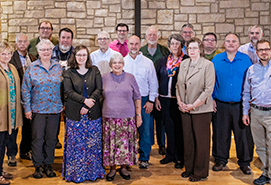Purpose
This specialized certificate provides a focus on the sacred texts of the Christian faith and methods of interpretation, particularly in conversation with intercontextual hermeneutics and global perspectives. The importance of rigorous and reflective engagement with scripture is stressed. A student will learn with scholars of both Testaments, who bring an expertise to the life, times, culture, and context in which the Bible was written with conversation for today’s application. This is suitable for anyone seeking to enhance their knowledge to be used for writing, teaching, preaching, and personal devotion.
Primary Faculty
Dr. Daniel W. Ulrich, Wieand Professor of New Testament Studies
Dr. Steven Schweitzer, Academic Dean and Professor
Dr. Dawn Ottoni-Wilhelm, Brightbill Professor of Preaching and Worship
Faculty from Earlham School of Religion, our partner seminary
Objectives
The Certificate in Intercontextual Biblical Interpretation provides a means to deepen one’s understanding of the Bible and methods of interpretation. The importance of rigorous and reflective engagement with scripture is stressed. Graduates with a Certificate in Intercultural Biblical Interpretation will
- skillfully interpret texts from both the Old and New Testaments using various scholarly data and methods, including historical, literary, and reader-centered approaches;
- articulate their own hermeneutical approaches to scripture in conversation with the Anabaptist-Pietist heritage, global realities, and their own particular context;
- practice intercontextual hermeneutics so as to find transformative meanings in scripture through a process of intentional dialogue between culturally diverse readers.
Courses
This certificate requires two foundational courses, one intercontextual hermeneutics course, one exegetical methods course, and one additional course for a total of 15 credit hours. The additional course may come from any course in the catalog listed as biblical studies, including biblical languages. Students can take any number of courses in a semester. Not all courses are offered every year. The certificate can be completed in one to two years.
Required Courses
- Introduction to Old Testament History and Literature*
- Reading the New Testament Contextually
- A course in intercontextual hermeneutics, such as:
- Global Perspectives on Scripture: 1 Corinthians
- Reading the Bible Contextually*
- Santa Biblia: Reading Scripture in Puerto Rico
- A course in exegetical methods
- Exegesis of the Gospel of Matthew
- Exegesis of Chronicles and Ezra-Nehemiah
One Additional Course
- Bible and Pastoral Care*
- Exegesis of Chronicles and Ezra-Nehemiah
- Exegesis of the Gospel of Matthew
- Gospel of Peace
- Hebrew I and II
- Images of God*
- Israel’s Wisdom Teachings*
- New Testament Foundations for Ministry
- New Testament Greek I and II
- Preaching the Gospel(s)
- Psalms*
- Writing Midrash*
*Offered through Earlham School of Religion
Admissions Process Deadlines
Fall session: May 15th
Spring session: November 15th
Cost
Total cost for 15 credit hours is $7,200. Students may apply for financial aid through Bethany: Church Service Covenant Grant, Academic Excellence Scholarship, and need-based aid.
Through our generous financial aid program, students may reduce their total tuition costs to as low as $2,200 for the entire certificate if it is completed in four semesters. There is a $350 extension fee if a fifth semester is needed. An institutional loan program is also available for those who qualify. For full details on financial aid, payment plans, and extension fees, contact the Admissions Office.
For more information on this certificate and courses, refer to the Academic Catalog.








 Green Circle: Bethany invests in 100% renewable energy.
Green Circle: Bethany invests in 100% renewable energy.